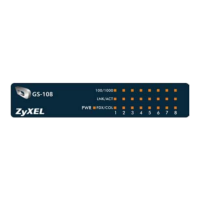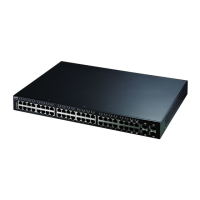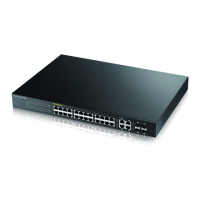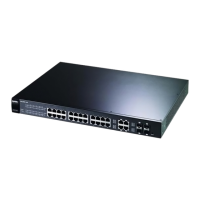Chapter 6 Basic Setting
GS3700/XGS3700 Series User’s Guide
94
Note: Up to 8 Switches per stack are allowed.
You can manage each Switch in the stack from a master Switch using its web configurator or
console. Each Switch supports up to two stacking channels. Use the master Switch to assign a ‘slot
ID’ for each ‘linecard’ non-master Switch. ‘Slot’ refers to a Switch in the the ‘virtual chassis’ stack.
The advantages of stacking are:
• High port density - for example, two 24-port Switches can become one 48-port logical Switch
• Centralized management - log into a single IP address of the master switch to control all
Switches in the stacking system using the web configurator, CLI, SNMP or FTP
• Redundancy - Data redundancy allows traffic to be forwarded even if one Switch in the stack
fails. Management redundancy lets you still manage the stack even if one Switch in the stack fails
• Modularity and hot-swappable - you can add, remove, or replace Switches to increase or
decrease the stack with minimum disruption to ongoing network traffic.
You can build a Switch stack using a ring or chain topology. In a ring topology, the last Switch is
connected to the first.
Figure 56 Stacking Topology
6.10.1 Stacking Status
Click Basic Setting > Stacking in the navigation panel to display the Stacking Status screen as
shown next.
XGS3700-48
XGS3700-48HP
Table 35 Switch Stacking
MODELS WITH STACKING SUPPORT

